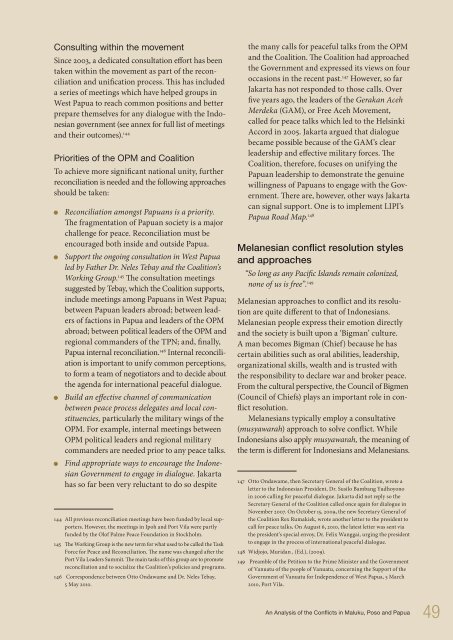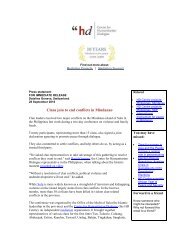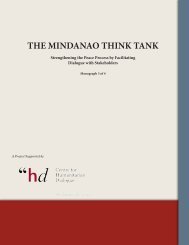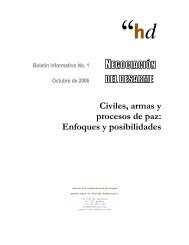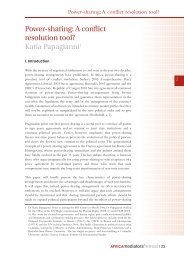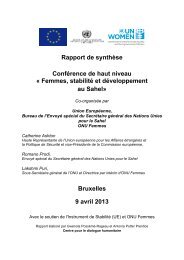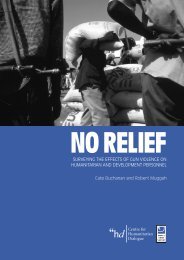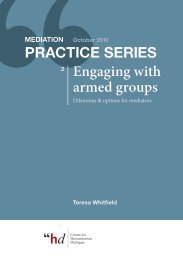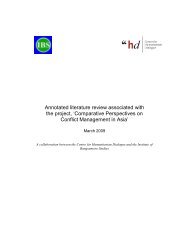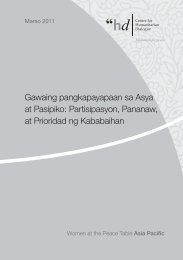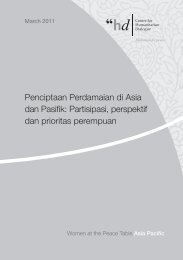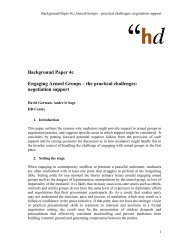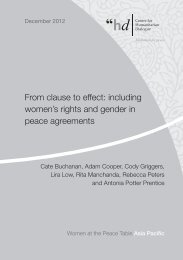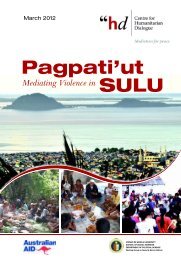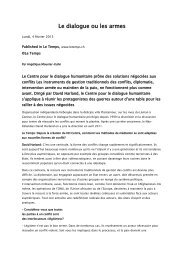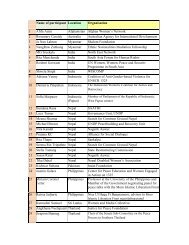Conflict Management in Indonesia â An Analysis of the Conflicts in ...
Conflict Management in Indonesia â An Analysis of the Conflicts in ...
Conflict Management in Indonesia â An Analysis of the Conflicts in ...
Create successful ePaper yourself
Turn your PDF publications into a flip-book with our unique Google optimized e-Paper software.
Consult<strong>in</strong>g with<strong>in</strong> <strong>the</strong> movement<br />
S<strong>in</strong>ce 2003, a dedicated consultation effort has been<br />
taken with<strong>in</strong> <strong>the</strong> movement as part <strong>of</strong> <strong>the</strong> reconciliation<br />
and unification process. This has <strong>in</strong>cluded<br />
a series <strong>of</strong> meet<strong>in</strong>gs which have helped groups <strong>in</strong><br />
West Papua to reach common positions and better<br />
prepare <strong>the</strong>mselves for any dialogue with <strong>the</strong> <strong>Indonesia</strong>n<br />
government (see annex for full list <strong>of</strong> meet<strong>in</strong>gs<br />
and <strong>the</strong>ir outcomes). 144<br />
Priorities <strong>of</strong> <strong>the</strong> OPM and Coalition<br />
To achieve more significant national unity, fur<strong>the</strong>r<br />
reconciliation is needed and <strong>the</strong> follow<strong>in</strong>g approaches<br />
should be taken:<br />
Reconciliation amongst Papuans is a priority.<br />
The fragmentation <strong>of</strong> Papuan society is a major<br />
challenge for peace. Reconciliation must be<br />
encouraged both <strong>in</strong>side and outside Papua.<br />
Support <strong>the</strong> ongo<strong>in</strong>g consultation <strong>in</strong> West Papua<br />
led by Fa<strong>the</strong>r Dr. Neles Tebay and <strong>the</strong> Coalition’s<br />
Work<strong>in</strong>g Group. 145 The consultation meet<strong>in</strong>gs<br />
suggested by Tebay, which <strong>the</strong> Coalition supports,<br />
<strong>in</strong>clude meet<strong>in</strong>gs among Papuans <strong>in</strong> West Papua;<br />
between Papuan leaders abroad; between leaders<br />
<strong>of</strong> factions <strong>in</strong> Papua and leaders <strong>of</strong> <strong>the</strong> OPM<br />
abroad; between political leaders <strong>of</strong> <strong>the</strong> OPM and<br />
regional commanders <strong>of</strong> <strong>the</strong> TPN; and, f<strong>in</strong>ally,<br />
Papua <strong>in</strong>ternal reconciliation. 146 Internal reconciliation<br />
is important to unify common perceptions,<br />
to form a team <strong>of</strong> negotiators and to decide about<br />
<strong>the</strong> agenda for <strong>in</strong>ternational peaceful dialogue.<br />
Build an effective channel <strong>of</strong> communication<br />
between peace process delegates and local constituencies,<br />
particularly <strong>the</strong> military w<strong>in</strong>gs <strong>of</strong> <strong>the</strong><br />
OPM. For example, <strong>in</strong>ternal meet<strong>in</strong>gs between<br />
OPM political leaders and regional military<br />
commanders are needed prior to any peace talks.<br />
F<strong>in</strong>d appropriate ways to encourage <strong>the</strong> <strong>Indonesia</strong>n<br />
Government to engage <strong>in</strong> dialogue. Jakarta<br />
has so far been very reluctant to do so despite<br />
144 All previous reconciliation meet<strong>in</strong>gs have been funded by local supporters.<br />
However, <strong>the</strong> meet<strong>in</strong>gs <strong>in</strong> Ipoh and Port Vila were partly<br />
funded by <strong>the</strong> Ol<strong>of</strong> Palme Peace Foundation <strong>in</strong> Stockholm.<br />
145 The Work<strong>in</strong>g Group is <strong>the</strong> new term for what used to be called <strong>the</strong> Task<br />
Force for Peace and Reconciliation. The name was changed after <strong>the</strong><br />
Port Vila Leaders Summit. The ma<strong>in</strong> tasks <strong>of</strong> this group are to promote<br />
reconciliation and to socialize <strong>the</strong> Coalition’s policies and programs.<br />
146 Correspondence between Otto Ondawame and Dr. Neles Tebay,<br />
5 May 2010.<br />
<strong>the</strong> many calls for peaceful talks from <strong>the</strong> OPM<br />
and <strong>the</strong> Coalition. The Coalition had approached<br />
<strong>the</strong> Government and expressed its views on four<br />
occasions <strong>in</strong> <strong>the</strong> recent past. 147 However, so far<br />
Jakarta has not responded to those calls. Over<br />
five years ago, <strong>the</strong> leaders <strong>of</strong> <strong>the</strong> Gerakan Aceh<br />
Merdeka (GAM), or Free Aceh Movement,<br />
called for peace talks which led to <strong>the</strong> Hels<strong>in</strong>ki<br />
Accord <strong>in</strong> 2005. Jakarta argued that dialogue<br />
became possible because <strong>of</strong> <strong>the</strong> GAM’s clear<br />
leadership and effective military forces. The<br />
Coalition, <strong>the</strong>refore, focuses on unify<strong>in</strong>g <strong>the</strong><br />
Papuan leadership to demonstrate <strong>the</strong> genu<strong>in</strong>e<br />
will<strong>in</strong>gness <strong>of</strong> Papuans to engage with <strong>the</strong> Government.<br />
There are, however, o<strong>the</strong>r ways Jakarta<br />
can signal support. One is to implement LIPI’s<br />
Papua Road Map. 148<br />
Melanesian conflict resolution styles<br />
and approaches<br />
“So long as any Pacific Islands rema<strong>in</strong> colonized,<br />
none <strong>of</strong> us is free”. 149<br />
Melanesian approaches to conflict and its resolution<br />
are quite different to that <strong>of</strong> <strong>Indonesia</strong>ns.<br />
Melanesian people express <strong>the</strong>ir emotion directly<br />
and <strong>the</strong> society is built upon a ‘Bigman’ culture.<br />
A man becomes Bigman (Chief) because he has<br />
certa<strong>in</strong> abilities such as oral abilities, leadership,<br />
organizational skills, wealth and is trusted with<br />
<strong>the</strong> responsibility to declare war and broker peace.<br />
From <strong>the</strong> cultural perspective, <strong>the</strong> Council <strong>of</strong> Bigmen<br />
(Council <strong>of</strong> Chiefs) plays an important role <strong>in</strong> conflict<br />
resolution.<br />
Melanesians typically employ a consultative<br />
(musyawarah) approach to solve conflict. While<br />
<strong>Indonesia</strong>ns also apply musyawarah, <strong>the</strong> mean<strong>in</strong>g <strong>of</strong><br />
<strong>the</strong> term is different for <strong>Indonesia</strong>ns and Melanesians.<br />
147 Otto Ondawame, <strong>the</strong>n Secretary General <strong>of</strong> <strong>the</strong> Coalition, wrote a<br />
letter to <strong>the</strong> <strong>Indonesia</strong>n President, Dr. Susilo Bambang Yudhoyono<br />
<strong>in</strong> 2006 call<strong>in</strong>g for peaceful dialogue. Jakarta did not reply so <strong>the</strong><br />
Secretary General <strong>of</strong> <strong>the</strong> Coalition called once aga<strong>in</strong> for dialogue <strong>in</strong><br />
November 2007. On October 15, 2009, <strong>the</strong> new Secretary General <strong>of</strong><br />
<strong>the</strong> Coalition Rex Rumakiek, wrote ano<strong>the</strong>r letter to <strong>the</strong> president to<br />
call for peace talks. On August 6, 2010, <strong>the</strong> latest letter was sent via<br />
<strong>the</strong> president’s special envoy, Dr. Felix Wanggai, urg<strong>in</strong>g <strong>the</strong> president<br />
to engage <strong>in</strong> <strong>the</strong> process <strong>of</strong> <strong>in</strong>ternational peaceful dialogue.<br />
148 Widjojo, Muridan , (Ed.), (2009).<br />
149 Preamble <strong>of</strong> <strong>the</strong> Petition to <strong>the</strong> Prime M<strong>in</strong>ister and <strong>the</strong> Government<br />
<strong>of</strong> Vanuatu <strong>of</strong> <strong>the</strong> people <strong>of</strong> Vanuatu, concern<strong>in</strong>g <strong>the</strong> Support <strong>of</strong> <strong>the</strong><br />
Government <strong>of</strong> Vanuatu for Independence <strong>of</strong> West Papua, 5 March<br />
2010, Port Vila.<br />
<strong>An</strong> <strong>An</strong>alysis <strong>of</strong> <strong>the</strong> <strong>Conflict</strong>s <strong>in</strong> Maluku, Papua Poso and Papua Poso 49


